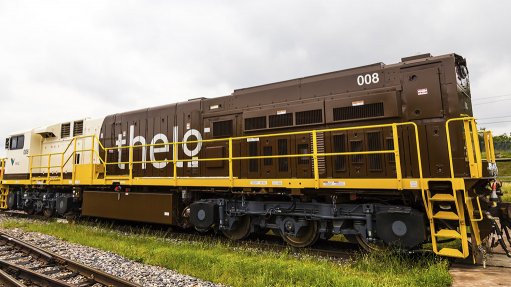
GREATER COLLABRATION Thelo DB and African Export-Import Bank will collaborate to support the modernisation of Africa’s railways
Photo by: Ben Bergh
Multilateral development finance bank African Export-Import Bank and local railway services company Thelo DB signed a memorandum of understanding (MoU) to develop, finance and operate railway projects in Africa.
Thelo DB is an incorporated partnership between Thelo Ventures and Germany-based railway company Deutsche Bahn, represented by engineering company DB Engineering & Consulting.
Under the terms of the MoU – signed in November last year – Thelo DB and African Export-Import Bank will collaborate to support the modernisation of Africa’s railways as a catalyst to promoting trade, investment and economic skills development.
“Through this agreement, we intend to combine the strengths of the two companies and offer clients a holistic approach to project development, financing and realisation,” Thelo DB CEO Jörg Marienhagen tells Engineering News.
He adds that Thelo DB has submitted multiple proposals – both proactively and reactively – on how it can support clients in Africa on the most imminent challenges and opportunities confronting them in the rail sector.
“We are in continuous engagement with decision-makers and considering the recognition of the role that railways can play in supporting economic development and job creation. We are confident that a number of decisions to proceed on critical projects will be taken.”
He adds that, through this MoU, Thelo DB hopes to work with national governments, regional economic blocks, railway operators, freight owners and other stakeholders in the sector. It also hopes to ensure that Africa develops and operates railway and mobility systems, and develop skills needed in this sector.
Thelo DB has the capacity and experience in all areas of rail, including policy planning, safety and regulation.
Moreover, Marienhagen mentions that South Africa has a relatively large and advanced railway market – in terms of infrastructure and skills – when compared with other countries in Africa.
Therefore, the MoU will present South Africa with an opportunity to enhance operational efficiencies, which will result in more passengers using rail and freight being moved from road to rail.
Meanwhile, Marienhagen points out that the regional integration and the Africa Continental Free Trade Agreement (AfCFTA) present an opportunity to expand and integrate the freight and passenger service locally and regionally.
The key to all international trade systems is an efficient cross-border transport solution that has to be in line with quantity, safety, reliability and pricing requirements, he elaborates.
Moreover, Marienhagen says that, in using well-balanced, tailored concession models, which have the correct network and corridor size, railway infrastructure can play a major role in the AfCFTA.
Business opportunities for rail infrastructure in South Africa have to be open to include freight owners and small businesses in the rail sector to seize the opportunities that the agreement presents. Consequently, the sector will impact positively on the economy, as it will provide opportunities across all business types and models, he explains.
There needs to be a rebalancing between road and rail, but in favour of railways, notes Marienhagen, adding that “for this to happen, it is imperative to have strong commitment and action from all the railway sector stakeholders”.
Marienhagen concludes that Thelo DB expects that rail as a mode of transport within a multimodal mix will form an important backbone for mobility in general moving forward.